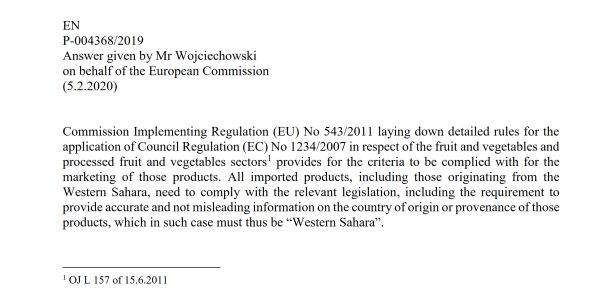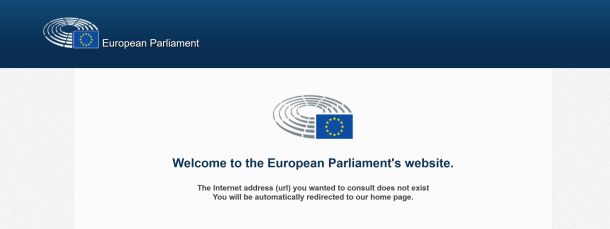The UN is clear that the representative of the people of Western Sahara is the Polisario Front. So what then, when the Court of Justice in its 21 December 2016 judgment states that EU-Morocco trade cannot include the territory of Western Sahara without first obtaining the consent from the representatives of the territory?
The EU's approach has consisted in four stages.
First, it concluded the negotiations with Morocco already on 31 January 2018 before starting any consent process.
Second, it has replaced the concept of 'prior consent' with 'post consult'.
Thirdly, it has made a primarily "Moroccan" selection of groups to consult.
Fourthly, it namedrops an encounter with Polisario, in which the latter clearly condemned the EU practices, as if Polisario had been invited for the purpose of being consulted.
This gives the impression that the EU is engaged in a wide stakeholder consultation dialogue, in which even Polisario is included. In the hearing in the Parliament on 20 February, the Head of the Maghreb Division of the EU External Action Service (EEAS) clarified which groups the EEAS was in dialogue with. The below comment was made by the EEAS official during the 20 February meeting (bold emphasis by Western Sahara Resource Watch).
Based on the presentation by the EEAS, WSRW sent them a letter today, containing 17 questions. See that letter here.
Western Sahara Resource Watch on 5 February 2018 told the EEAS that it regrettfully would not take part in a meeting it had been invited to, as we did not want to contribute to an apparent attempt to legitimize a negotiation process that completely disregards the right to consent of the people of Western Sahara.Statement by Mr. Vincent Piket, Head of the Maghreb Division in the EU External Action Service, in the INTA Committee, 20 February 2018
“Thank you very much, indeed. The Council Secretariat has sent to the Parliament the negotiation mandate, so you will have read in that what Member States expect the Commission and the External Action Service to provide.
As regards the involvement of the people concerned by the amendment, the involvement procedure of the people concerned has started. We have set out a program of meetings that is taking place both in Rabat and in Brussels. We have selected for that purpose a list of interlocutors that is very wide-ranging, very diversified. There are Members of Parliament in there, there are members of the regional councils from Western Sahara, we have socio-economic stakeholders in our list of interlocutors; the Chambers of Commerce, Fisheries and Agriculture Chambers particularly from venues inside Western Sahara, Dakhla and El Aaiun in particular. Research institutes, we have economic operators and the development agency of Western Sahara.
And a third category is civil society organisations in the strictest sense, focusing on human rights, particularly human rights of the Saharawi people. We have quite a variety of them. All organisations are registered in Morocco, that was one condition for us: to be able to speak to registered organisations. But we have a very broad spectrum there. Both organisations that are politically neutral so to say, as well as organisations, NGO organisations that are very supportive of Polisario. I mention Polisario: Polisario is also in our list of interlocutors and we met with them early in February.
Now the work is not yet done. We are let’s say roughly halfway, maybe more than that, in our meetings, and we hope to conclude them by the end of this month. And we hope to have gotten on that basis a very reliable insight into how the people concerned by the agreement in Western Sahara feel about this amendment: whether they see the benefit of it or not, in the economic or socio-economic sense, and whether there are any other objections to it, or other kinds of support for it.
So the findings of our meetings will be laid down in the report that the Commission will be sending to the Council and to Parliament, together with the official amendment proposal. So I will not go into the content of that just yet because the exercise is still ongoing.
Lastly I should say that the Moroccan authorities on their side will also be conducting a consultation exercise. The government is going to ask for a vote on the amendment in two levels: first of all in the external relations committee of the House of Representatives on a national level, and secondly, they’re going to call for votes in the regional councils of Western Sahara. That’s councils that look more at the regional, local interest. By holding those votes, the government of Morocco will – in their report on that – itemize in particular the voting behavior of the Saharawi people both at the level of the national assembly as well as at the level of the regional councils, in order indeed to be able to see the level of support for this amendment of that particular group of MPs and deputies.
Thank you.”
EU Commission backtracks on labelling Western Sahara goods
What is EU's position on labelling of products from occupied Western Sahara? The EU Commission has now for the third time published a response to a parliamentary question on the matter, but the latest version fails to address the question.
Why does this EU statement keep disappearing?
A clarification by the EU Commission on labelling of products from Western Sahara was published, then removed, then published again and has now been removed again from EU websites.
EU reaffirms: Western Sahara products to be labelled as such
Two weeks ago, the EU Commission announced that products from Western Sahara should be labelled accordingly, only to withdraw that statement the very next day. Today, the Commission reaffirms its original position.
Spectacular backtracking by EU Commission on Western Sahara labelling
On 5 February 2020, the EU Commission announced that products from Western Sahara should be labelled accordingly. But about 24 hours later, all traces to that statement had been removed from EU websites.



